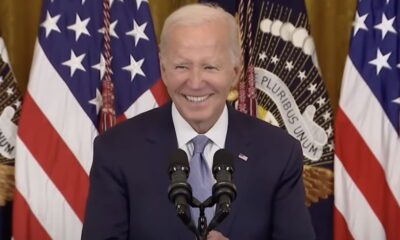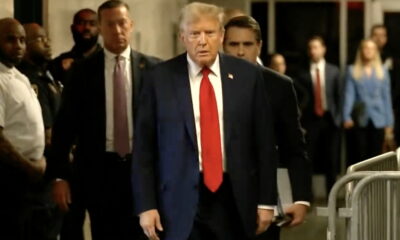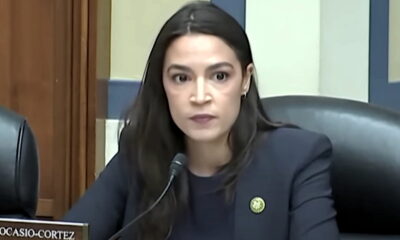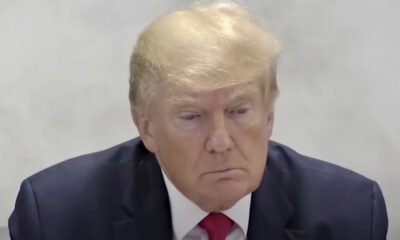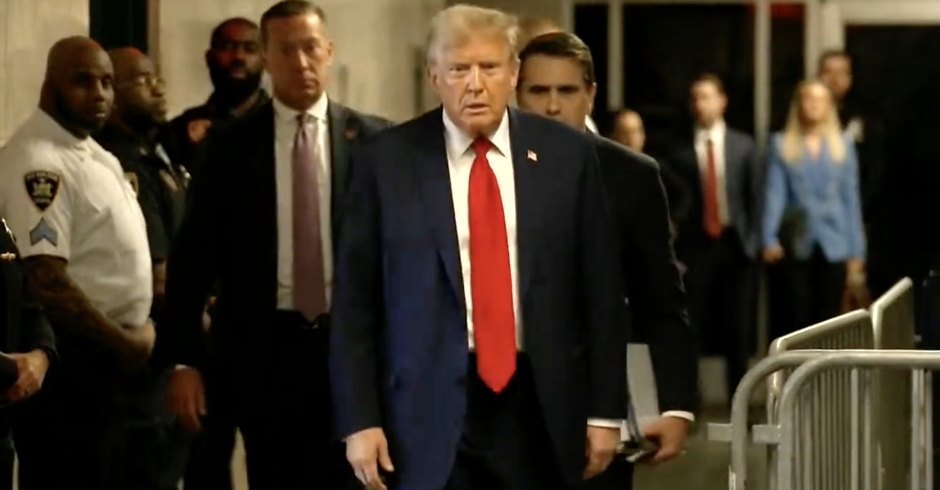News
Clarence Thomas’ 38 Vacations: The Other Billionaires Who Have Treated the Supreme Court Justice to Luxury Travel
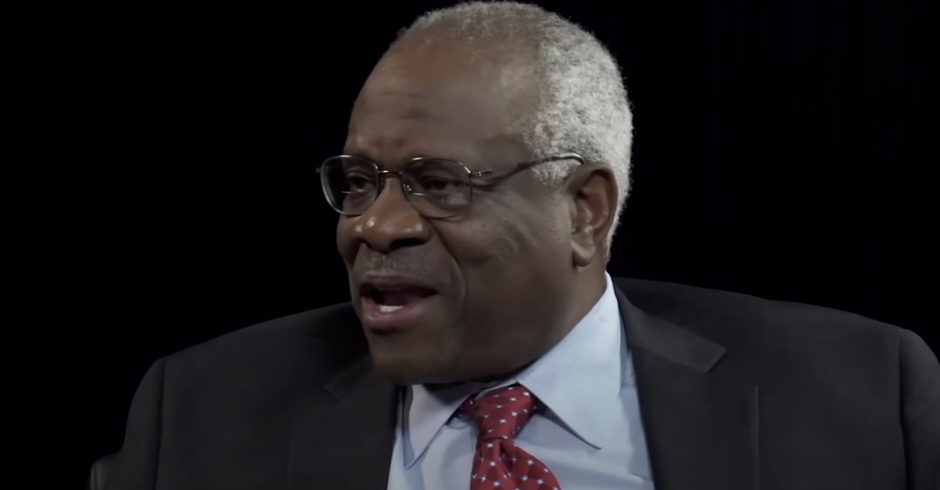
This story was originally published by ProPublica.
ProPublica is a Pulitzer Prize-winning investigative newsroom. Sign up for The Big Story newsletter to receive stories like this one in your inbox.
Series: Friends of the Court:SCOTUS Justices’ Beneficial Relationships With Billionaire Donors
Supreme Court Justice Clarence Thomas’ decadeslong friendship with real estate tycoon Harlan Crow and Samuel Alito’s luxury travel with billionaire Paul Singer have raised questions about influence and ethics at the nation’s highest court.
During his three decades on the Supreme Court, Clarence Thomas has enjoyed steady access to a lifestyle most Americans can only imagine. A cadre of industry titans and ultrawealthy executives have treated him to far-flung vacations aboard their yachts, ushered him into the premium suites at sporting events and sent their private jets to fetch him — including, on more than one occasion, an entire 737. It’s a stream of luxury that is both more extensive and from a wider circle than has been previously understood.
Like clockwork, Thomas’ leisure activities have been underwritten by benefactors who share the ideology that drives his jurisprudence. Their gifts include:
At least 38 destination vacations, including a previously unreported voyage on a yacht around the Bahamas; 26 private jet flights, plus an additional eight by helicopter; a dozen VIP passes to professional and college sporting events, typically perched in the skybox; two stays at luxury resorts in Florida and Jamaica; and one standing invitation to an uber-exclusive golf club overlooking the Atlantic coast.
This accounting of Thomas’ travel, revealed for the first time here from an array of previously unavailable information, is the fullest to date of the generosity that has regularly afforded Thomas a lifestyle far beyond what his income could provide. And it is almost certainly an undercount.
While some of the hospitality, such as stays in personal homes, may not have required disclosure, Thomas appears to have violated the law by failing to disclose flights, yacht cruises and expensive sports tickets, according to ethics experts.
Perhaps even more significant, the pattern exposes consistent violations of judicial norms, experts, including seven current and former federal judges appointed by both parties, told ProPublica. “In my career I don’t remember ever seeing this degree of largesse given to anybody,” said Jeremy Fogel, a former federal judge who served for years on the judicial committee that reviews judges’ financial disclosures. “I think it’s unprecedented.”
This year, ProPublica revealed Texas real estate billionaire Harlan Crow’s generosity toward Thomas, including vacations, private jet flights, gifts, the purchase of his mother’s house in Georgia and tuition payments. In an April statement, the justice defended his relationship with Crow. The Crows “are among our dearest friends,” Thomas said. “As friends do, we have joined them on a number of family trips.”
The New York Times recently surfaced VIP treatment from wealthy businessmen he met through the Horatio Alger Association, an exclusive nonprofit. Among them were David Sokol, a former top executive at Berkshire Hathaway, and H. Wayne Huizenga, a billionaire who turned Blockbuster and Waste Management into national goliaths. (The Times noted Thomas gives access to the Supreme Court building for Horatio Alger events; ProPublica confirmed that the access has cost $1,500 or more in donations per person.)
Records and interviews show Thomas had another benefactor, oil baron Paul “Tony” Novelly, whose gifts to the justice have not previously been reported. ProPublica’s totals in this article include trips from Crow.
Each of these men — Novelly, Huizenga, Sokol and Crow — appears to have first met Thomas after he ascended to the Supreme Court. With the exception of Crow, their names are nowhere in Thomas’ financial disclosures, where justices are required by law to publicly report most gifts.
The total value of the undisclosed trips they’ve given Thomas since 1991, the year he was appointed to the Supreme Court, is difficult to measure. But it’s likely in the millions.
Huizenga sent his personal 737 to pick Thomas up and bring him to South Florida at least twice, according to John Wener, a former flight attendant and chef on board the plane. If he were picked up in D.C., the five-hour round trip would have cost at least $130,000 each time had Thomas chartered the jet himself, according to estimates from jet charter companies. In February 2016, Thomas flew on Crow’s private jet from Washington to New Haven, Connecticut, before heading back on the jet just three hours later. ProPublica previously reported the flight, but newly obtained U.S. Marshals Service records reveal its purpose: Thomas met with several Yale Law School deans for a tour of the room where they planned to display a portrait of the justice. (Crow’s foundation also gave the school $105,000, earmarked for the “Justice Thomas Portrait Fund,” tax filings show.)
Don Fox, the former general counsel of the U.S. Office of Government Ethics and the senior ethics official in the executive branch, said, “It’s just the height of hypocrisy to wear the robes and live the lifestyle of a billionaire.” Taxpayers, he added, have the right to expect that Supreme Court justices are not living on the dime of others.
Fox, who worked under both Democrat and Republican administrations, said he advised every new political appointee the same thing: Your wealthy friends are the ones you had before you were appointed. “You don’t get to acquire any new ones,” he told them.
Thomas and Novelly did not respond to a detailed list of questions for this story. Huizenga died in 2018 and his son, who is the president of the family’s holding company, also did not respond to multiple requests for comment.
In a statement to ProPublica, Sokol said he’s been close friends with the Thomases for 21 years and acknowledged traveling with and occasionally hosting them. He defended the justice as upright and ethical. “We have never once discussed any pending court matter,” Sokol said. “Our conversations have always revolved around helping young people, sports, and family matters.”
“As to the use of private aviation,” he added, “I believe that given security concerns all of the Supreme Court justices should either fly privately or on governmental aircraft.”
The justices have said they follow court rules prohibiting them from accepting gifts from a group of people so frequently that “a reasonable person would believe that the public office is being used for private gain.” But what actually constitutes a gift under those rules is ambiguous and, in practice, justices have few restrictions on what they can accept. Other members of the court have accepted travel underwritten by wealthy businessmen and speaking invitations at universities. Stephen Breyer accepted a flight to a Nantucket wedding from a Democratic megadonor. Ruth Bader Ginsburg took a tour of Israel and Jordan paid for by an Israeli billionaire. Those gifts are public because Breyer and Ginsburg disclosed them.
Thomas, however, is apparently an extreme outlier for the volume and frequency of all the undisclosed vacations he’s received. He once complained that he sacrificed wealth to sit on the court, though he depicted the choice as a matter of conscience. “The job is not worth doing for what they pay,” he told the bar association in Savannah, Georgia, in 2001, “but it is worth doing for the principle.”
To track Thomas’ relationships and travel, ProPublica examined flight data, emails from airport and university officials, security detail records, tax court filings, meeting minutes and a trove of photographs from personal albums, including cards that Thomas’ wife, Ginni, sent to friends. In addition, reporters interviewed more than 100 eyewitnesses and other sources: jet and helicopter pilots, flight attendants, airport workers, yacht crew members, security guards, photographers, waitresses, caterers, chefs, drivers, river rafting guides and C-suite executives.
ProPublica has not identified any legal cases that Huizenga, Sokol or Novelly had at the Supreme Court during their documented relationships with Thomas, although they all work in industries significantly impacted by the court’s decisions.
In a small-circulation biography given to Huizenga’s friends and family, Thomas acknowledged that he and Huizenga discussed some of the billionaire’s companies but said their relationship was never transactional. “It wasn’t that kind of friendship,” he told the interviewer. The justice said they’d prefer to go to a small restaurant in a strip mall or sit on the billionaire’s lawn and drink tea or diet soda.
“We are in a society where everything is quid pro quo,” Thomas said, but not with the Huizengas. “I don’t do anything for them and they can’t do anything for me.”
“Four Lucky Couples”
On Labor Day weekend 2019, Thomas boarded a private plane in Washington, D.C., for the first leg of a sojourn out West. The vacation had been months in the making and, thanks to Sokol, it was all taken care of. He’s hosted the Thomases virtually every summer for a decade.
The first stop was the Great Plains. It was the home opener at the University of Nebraska-Lincoln, which Ginni Thomas had attended before transferring. The Thomases were joined there by other couples, including one of the justice’s most vocal advocates, Mark Paoletta, who then worked for the federal government, and his wife.
Sokol, a major university donor who graduated from the Omaha campus, arranged for the group to attend the football and volleyball games with all-access passes. Clarence Thomas met with the football team the day before the game. The group walked out of the tunnel before kickoff. During halftime, they stood on the sidelines to watch the marching band perform, at one point posing for a picture in the end zone: “The Sokols took four lucky couples to the first Nebraska footbal game of the season,” Ginni Thomas wrote in one of the card captions.
Sokol runs a private equity firm and now also chairs a holding company that owns large international shipping and power utility corporations. He resigned from Berkshire Hathaway in 2011 amid an internal investigation by the company that found he had violated its insider trading policy. (At the time, Sokol denied wrongdoing and said his resignation was unrelated to the episode; he was never indicted.)
That Saturday, the group watched both the football and volleyball games from luxury suites. The football skybox, which typically costs $40,000 annually, belonged to Tom Osborne, a former Republican congressman who was also the head coach of the team for 25 years. Hosting the Thomases had ripple effects. A local priest requested a ticket for his 87-year-old mother, but the volleyball coach had to tell him none was available. “All of our tickets have been taken for Clarence Thomas and his group,” the coach wrote.
The Thomases have been treated to at least seven University of Nebraska-Lincoln games — five arranged by Sokol — in recent years. The Times first reported on Thomas’ appearances at some of them.
Thomas has never reported any of those tickets on his yearly financial forms. Judiciary disclosure rules require that most gifts worth more than $415 be disclosed. “It’s so obvious,” said Richard Painter, former chief White House ethics lawyer for President George W. Bush. “It all has to be reported.” ProPublica identified more than 60 federal judges who disclosed tickets to sporting events between 2003 and 2019. In 1999, Thomas disclosed private flight and accommodations for the Daytona 500 but hasn’t reported any other sporting events before or since.
In a statement, Osborne confirmed Thomas has “watched a couple of football games” in his suite, which the university had given to him. He said he is “taxed” for the use of the suite but did not answer whether Thomas has ever reimbursed him. The University of Nebraska-Lincoln did not respond to requests for comment.
On Sunday, the morning after the football game in Nebraska, Sokol flew with Thomas by private jet to Sokol’s Paintbrush Ranch just outside Jackson Hole, Wyoming. The property, valued in the low eight figures, sits in the foothills of Shadow Mountain. A local radio personality said of the estate: “This is the ultimate home and it has the most iconic view of the Tetons I’ve seen. Ever.”
Sokol also owns a waterfront mansion in Fort Lauderdale, Florida, currently worth $20.1 million, where he’s hosted the Thomases as well, according to photos of the visits. The 12,800-square-foot property includes a home theater, elevator, walk-in wine cellar and yacht docking. (In addition, Sokol and Thomas have shared an opulent lodge together while vacationing at Crow’s private lakeside resort, Camp Topridge, in the Adirondacks.)
In Wyoming, the Thomases fished, rafted on the Snake River and sat by a campfire overlooking the Teton Range with the other couples. At one point, the Paolettas serenaded the justice with a song they wrote about him.
Like Thomas, Paoletta did not disclose the trip on his yearly financial filings. At the time, Paoletta was general counsel and the designated ethics official at the Office of Management and Budget. In a statement, Paoletta said he wasn’t required to disclose the trip because he had reimbursed Sokol, but he did not say how much or provide documentation of those payments. “I complied with all ethics laws and regulations,” Paoletta said.
Details of the vacation to Nebraska and Wyoming were drawn from photographs, trip planning emails and social media posts, as well as interviews with airport workers, local residents and others familiar with the travel, including river raft guides.
Since 1990, Sokol and his wife have donated more than $1 million to Republican politicians and groups, along with smaller amounts to Democrats. Last October, in New Orleans, Sokol made a direct reference to a pending Supreme Court case while addressing a group of former Horatio Alger scholarship recipients. (Thomas was not in attendance.)
The speech veered into territory that made many of those in attendance uncomfortable and left others appalled, emails and others messages show. Sokol, who has written extensively about American exceptionalism and the virtues of free enterprise, minimized slavery and systemic racism, some felt. He then criticized President Joe Biden’s student loan forgiveness plan, arguing Biden had overstepped the government’s authority, according to a recording of the speech obtained by ProPublica.
“It’s going to get overturned by the Supreme Court,” Sokol predicted, echoing a common legal commentary.
He was right. This summer, the court struck down Biden’s student loan forgiveness plan. Thomas voted in the majority.
Deep Sea Fishing in the Caribbean
Nearly every spring, Novelly, a billionaire who made his fortune storing and transporting petroleum, takes his two yachts on a fishing expedition to the Bahamas’ Exuma Islands. Photographs from the trips show porcelain beaches, cerulean waters and fresh mahi-mahi. Friends and family come and go for days at a time.
Three of Novelly’s former yacht workers, including a captain, told ProPublica they recall Thomas coming on board the vessels multiple times in recent years. Novelly’s local chauffeur in the Bahamas said his company once picked Thomas up from the billionaire’s private jet and drove him to the marina where one of the yachts, Le Montrachet, frequently docks.
Le Montrachet, named after the premium French wine, is a 126-foot luxury vessel complete with a full bar, multiple dining areas, a baby grand piano, accommodations for 10 guests and a handful of smaller fishing boats and jet skis. Novelly charges about $60,000 a week to outsiders who want to charter it.
Another past guest on Novelly’s yacht is “Alligator” Ron Bergeron, one of the biggest land and roadway developers in Florida. Around 2018, Novelly and Thomas went to Bergeron’s private ranch on the edge of the Everglades — a sprawling, gated estate with centuries-old cypress trees and an 1800s-style saloon on site. He described Novelly as a man who likes to share his success with others. “He’s very generous with all his friends,” Bergeron told ProPublica.
Bergeron said his conversations with Thomas at the ranch were strictly about charity work and not business. “You’re talking about a great man,” Bergeron said, “who gives his time to make a difference for America.”
Since 1999, Novelly’s family and companies have publicly disclosed at least $500,000 to conservative causes and Republican candidates in federal elections. (Before then, he had given to both parties.)
Novelly, who recently stepped down from his CEO roles, ran his business affairs aggressively, ending up on the wrong side of the government in at least two cases. He spends much of his time between St. Louis and Boca Raton, Florida, where he has a 23,000 square-foot palatial estate appraised at $22.2 million. In 2002, Novelly established residency and a holding company in the Virgin Islands. During a hearing with local officials, Novelly described the arrangement there as a “quid pro quo,” meaning the U.S. territory received a boost to the local economy in return for offering substantial tax breaks. The IRS would later call it an “abusive tax avoidance scheme” and pursued Novelly for millions in back taxes and penalties. Novelly denied the characterization and eventually settled with the government for a negotiated amount.
There’s no evidence his friendship with Thomas helped Novelly in one of his most significant disputes. In 2005, the Justice Department sued Novelly’s company, Apex Oil, because its corporate predecessor had contributed to a massive groundwater contamination beneath an Illinois village and then Apex refused to help with the cleanup. Apex argued the spill had occurred before the company went through a bankruptcy years earlier. Several judges ruled against Apex, which eventually appealed to the Supreme Court in 2010. The justices declined to hear the case, and the company had to pay about $150 million to help remove oil from the soil.
It’s not clear how Thomas voted in the case because such votes are not typically public. The vacations ProPublica identified appear to have occurred after the case was resolved.
In 2020, Apex Oil, Sokol and Crow helped fund a documentary defending Thomas as a response to an HBO film that was critical of the justice. Sokol called the HBO movie a “Molotov cocktail into our homes” and a prime example of America’s eroding civility.
The “Most Coveted” Invitation in the World
Thomas’ first billionaire benefactor is likely H. Wayne Huizenga, believed to be the only person in American history to build three separate Fortune 500 companies. One of the three was AutoNation, which Huizenga founded in 1996 before building it into the largest car dealer in the country. Between 1998 and 1999, Huizenga’s holding company spent $500,000 lobbying federal agencies that regulate the automotive industry, according to OpenSecrets data. Over the years, the Huizenga family and companies gave millions to state and federal Republican candidates and once threw a fundraiser for the Florida GOP that helped keep the party afloat for months.
The billionaire was known to regularly lavish gifts and perks on those in his orbit. He routinely took friends on opulent vacations. He paid his employees handsomely and sometimes covered their bills and personal expenses. On a whim, Huizenga once handed box tickets for the opera, which were worth thousands, to his caterer, Bob Leonardi.
“I led the life of a multimillionaire without being one,” Leonardi said.
For 20 years, Thomas benefited from Huizenga’s attention as well, availing himself of the billionaire’s fleet of aircraft and other luxuries. Huizenga took Thomas to see the Miami Dolphins and Florida Panthers several times between the mid-’90s and mid-2000s, according to interviews and photographs. Huizenga owned both teams at the time.
Executives saw Thomas around Huizenga’s office often. Richard Rochon, the former president of Huizenga Holdings, said Thomas once shadowed the billionaire during meetings. “He just wants to see what I do every day,” Rochon recalled Huizenga saying.
On at least two occasions, Thomas attended Huizenga’s birthday and Christmas parties, which the billionaire held inside his private hangar at the Fort Lauderdale airport. Van Poole, a lobbyist and former chairman of the Florida GOP, recalled riding down the elevator at the nearby Hyatt Pier 66 hotel — which Huizenga also controlled — when the Thomases stepped in with a security detail. The group discussed college sports and then traveled to the party together, Poole said.
Thomas occasionally flew on Huizenga’s helicopters, sometimes taking off from the roof of the corporate headquarters, and at least one of his Gulfstream jets around Florida, according to his former pilots. But the billionaire’s most luxurious planes were a pair of 737 jets he had retrofitted like a lounge, complete with recliners, love seats, mahogany dining and card tables and gourmet food.
At least two times in the mid 2000s, Huizenga sent one of them to pick up Thomas and deliver him to Fort Lauderdale, said John Wener, the flight attendant on board.
Wener recalled chatting with the justice about his nomination to the Supreme Court and the tumultuous Senate confirmation hearings after Thomas’ former aide, Anita Hill, accused him of sexual harassment. “He said, ‘Just imagine a job interview and you’re in front of 100 people that hate you,’” Wener recalled Thomas remarking. “‘How would that interview go?’”
In the early 2000s, Huizenga gave Thomas something that was priceless at the time: a standing invitation to his exclusive, members-only golf club, the Floridian. Designed by golf legend Gary Player, the course was lined with cottages for Huizenga’s friends, a yacht marina for them to dock and a helipad if they wanted to fly in. One family friend told the Huizenga family biographer that the Floridian was “the most coveted private golf invitation in the world.” Those who worked and played there said the membership rolls were a Rolodex of the rich, famous and powerful: From Michael Douglas and Rush Limbaugh to Michael Bloomberg and former Vice President Dan Quayle. Donald Trump once asked to be a member but Huizenga spurned him, according to three of Huizenga’s former employees.
All 200-plus members were “honorary” and didn’t pay dues — Huizenga covered everything. “It was a little slice of heaven, a magical place,” former media personality Matt Lauer told the biographer. “You drove through the gates and it was this fairytale land that he had created.”
It’s unclear if Thomas was a member or Huizenga’s frequent guest with similar privileges. The billionaire’s former personal photographer and two former golf pros at the club recalled seeing Thomas there multiple times over the years. One of Huizenga’s helicopter pilots said he had picked the justice up from the property. And a fifth employee, a former waitress and concierge, said she once served Thomas and Huizenga, who were wearing golf attire, as they dined alone in the enormous waterfront clubhouse for lunch. “Have you met a Supreme Court justice?” Huizenga asked the waitress before she took their order. “This is Clarence Thomas.”
Today, the Floridian, which the Huizenga family sold in 2010 before it underwent renovations, has a $150,000 initiation fee.
Paying for Access to the Supreme Court Chambers
Thomas first met Huizenga at a formal gala in Washington, D.C., in 1992, when they were both inducted into the Horatio Alger Association. Henry Kissinger and Maya Angelou were among the other honorees that year. The organization, named after the 19th-century novelist who popularized rags-to-riches folklore, gives millions in college scholarships each year and also brings together some of the country’s wealthiest, self-made business tycoons for opulent events. (In real life, Alger was a minister on Cape Cod who resigned from his parish after he was credibly accused of molesting boys.)
“We were proud to honor Justice Thomas more than 30 years ago,” an association spokesperson said in a statement, “and remain grateful for his continued involvement in our organization.” She said Thomas spends countless hours mentoring scholarship recipients.
Thomas appears to have met Huizenga, Sokol, Novelly and Bergeron through the organization. Several of Thomas’ trips to Florida in the 2000s appear to have been connected with the association. In that time period, he joined Huizenga at Horatio Alger scholarship ceremonies in South Florida, travel that the justice disclosed in several of his yearly financial filings.
However, he never identified Huizenga in any of his disclosures. The association spokesperson confirmed to ProPublica that the billionaire hosted those events “and covered all costs involved.”
Experts said that means Thomas’ disclosures would be, at a minimum, incomplete and misleading because the rules require federal judges to identify the source of the gifts they receive. “Source means the person or entity that paid for it,” said Kathleen Clark, a legal ethics authority at Washington University in St. Louis.
Belonging to the association has had its privileges. As part of a board meeting, the Thomases once went on a lavish trip to Jamaica, where they were hosted by a wealthy donor who owned a luxury hotel atop a former sugar plantation. Johnny Cash performed. Horatio Alger Association membership itself is worth at least $200,000, according to the organization’s meeting minutes in 2007, a sum that those who nominate a new member are responsible for raising in that person’s honor. The association spokesperson said there was no requirement to raise money for new members back when Thomas was inducted.
Thomas has likely helped the group earn many times that figure since then. Every year, the justice hosts an event for members inside the Supreme Court’s Great Hall. The Times previously reported that the event afforded the Horatio Alger Association unusual access to the court.
ProPublica examined boxes of the association’s historical archives, including financial records that show the group has required donations of at least $1,500 — $7,500 for nonmembers — to attend the Supreme Court event. In 2004, those who donated $100,000 for a table at the main ceremony got 10 seats inside the Supreme Court. In the judiciary’s code of conduct — which is general guidance that does not apply to Supreme Court justices, though they say they consult it — there is explicit language advising federal judges against using their position to fundraise for outside organizations.
But that’s what Thomas has done, said Virginia Canter, a former government ethics lawyer who served in administrations of both parties and reviewed the association’s financial records at ProPublica’s request.
“To use the Supreme Court to fundraise for somebody’s charity is, to me, an abuse of office,” she said. Canter acknowledged the organization may do good work, but that’s besides the point, she said, because wealthy donors aren’t supposed to be able to pay thousands of dollars to visit a justice inside the courthouse walls.
“It’s pay to play,” Canter added, “isn’t it?”
Enjoy this piece?
… then let us make a small request. The New Civil Rights Movement depends on readers like you to meet our ongoing expenses and continue producing quality progressive journalism. Three Silicon Valley giants consume 70 percent of all online advertising dollars, so we need your help to continue doing what we do.
NCRM is independent. You won’t find mainstream media bias here. From unflinching coverage of religious extremism, to spotlighting efforts to roll back our rights, NCRM continues to speak truth to power. America needs independent voices like NCRM to be sure no one is forgotten.
Every reader contribution, whatever the amount, makes a tremendous difference. Help ensure NCRM remains independent long into the future. Support progressive journalism with a one-time contribution to NCRM, or click here to become a subscriber. Thank you. Click here to donate by check.
 |



